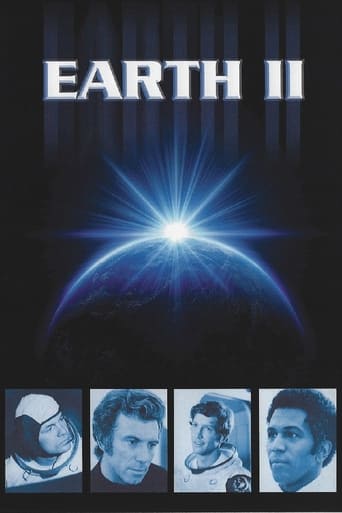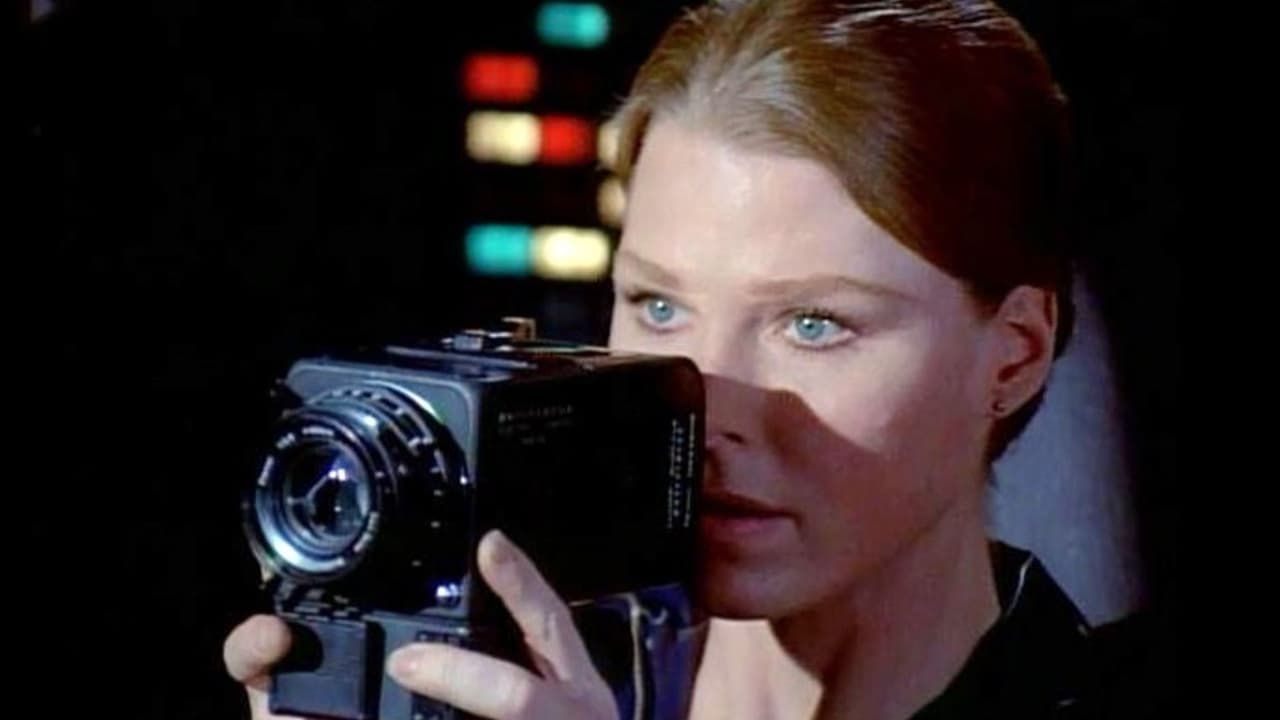am2star
I saw this TV-movie when it aired in 1971. I liked it then and saw it a few times in syndication. Now I own it on DVD.The premise is that an orbiting space station is created by the United States and then is set up as an independent nation named Earth II. This nation is completely democratic, with a council that executes policies for the station. If someone disagree, they can challenge that decision and all the citizens can vote.A situation occurs where the "no weapons" policy is challenged. A nuclear bomb is orbit around Earth, and passes close to the station on every orbit. The citizens have to make a choice whether to interfere with the bomb, in order to protect themselves and Earth.The movie stars Gary Lockwood of "2001: A Space Odyssey" fame, Hari Rhodes and Scott Hylands. In a supporting role is Gary Merrill. Since this was probably a pilot, the guest cast included Tony Franciosa and Mariette Hartley.While the film is dated and some of the science not so accurate, it is still very well done and for science fiction fans, should be seen.One complaint is that there are two excellent actors playing Chinese representatives. These are Soon-Tek Oh and James Hong. They are uncredited, which is unfortunate.
pro_crustes
A couple of years before Gene Roddenberry was trying to start new series with his movies "Genesis II" and "Planet Earth" (or is that "movie"?), this superior film with the oddly similar name paved the way. Alas, the road came to a dead-end, as all movies of this kind in the early '70s failed to understand that good story is better than bad sfx. This one is about a space station that has a unique social structure intended to eliminate conflict. The concept was handled in a simplistic way, but it nevertheless had a kind of wistful hopefulness about it that seemed not entirely incredible in 1971.Like Roddenberry's films, this one fits into a short-lived era of TV sf that seemed suspended between Chesley Bonestell's airbrushed vision of the near future of space colonization, and Ralph McQuarrie's grittier, plumber's-nightmare versions that would soon follow. A bit of "2001" can be seen here and there as well (for example, when the characters walk "up" a wall).If you liked the kind of austere models and similarly inornate acting (scripts, too) of early '70s sf, you'll like this one. The dilemma faced by the characters is familiar, as is its solution (but please overlook the glaring error involving the sun, the Earth, and the station's rotation). Still, there's a lost sense of "coming real soon now" in modern sf that this film might bring back to your memory. In 1971, it seemed we were _all_ going to fly in space and get to walk up walls. You know what happened next, but you didn't see it coming when this movie was new, so you believed it more then than you would today. See it again, if you get the chance, and ask yourself how we lost interest in going into orbit ourselves.
Brian Washington
This is a very rare made for TV movie with a great story and excellent special effects. The only thing that might be considered wrong about this film is that even though it is supposedly set in the future, this film is now very much dated. This film was made during the height of the Cold War and at a time relations between The U.S., the then Soviet Union and China were not very good. In fact, the U.S. is almost looked at as a pawn in the struggle between the other two super powers. However, this film does provide a good glimpse at the future and how space travel could eventually be routine and the possibilities of global cooperation in outer space.
TVholic
Earth II was a very earnest attempt at serious science fiction, a decided rarity in the early 1970s. It dealt with the establishment of the first orbital space colony in an unspecified year. Today, 28 years later, it's interesting to see many of the ideas represented here creeping toward reality. Only now is the International Space Station being constructed, and it bears a passing resemblance to the fictional Earth II. Both are designed to be independent of any one nation. There's a mention of a Mars mission under construction at E-II, much as today's planners say the ISS is essential to a manned mission to Mars. The early lifting-body shuttle of E-II is finally being realized in the X-33 and the VentureStar spacecraft.Scientific jargon abounds in this picture, and it's to the movie's credit that it's more often than not used properly rather than as technobabble. The writers, with help from technical advisors and NASA, were respectful of the science -- an extraordinary step for SF movies, especially on television. This is a thinking person's science fiction, with complex situations and human interactions rather than space battles, bumpy-headed aliens, ray guns, post- apocalyptic mutants and the like.The inspiration and influences of "2001: A Space Odyssey," two years previous, are obvious. First and foremost was the presence of Gary Lockwood, who played Frank Poole in 2001. There's also the reverence of the spaceflight sequences that bear a striking resemblance to their predecessors. Contemporary orchestral music takes the place of classical music from the masters, still trying hard to show the majesty and reality of space. The first third of the movie is spent introducing the wonders of living in this new environment with its unfamiliar physical conditions and a unique social structure very much a product of idealistic 1960s egalitarianism. Adult residents of Earth II were mandated to "attend" all important community functions via TV, and any inaccuracies and unsupported opinions on both sides of the debate were instantly pointed out by on-screen captions. If only today's voters could be as well-informed and responsible.Where this movie founders somewhat is in its pacing. Sometimes it can be tough slogging, seeming quite a bit longer than its 1:45 running time. It's talky at times, even preachy in spots. A saving grace is that, despite the inescapable aging of much of the technology, the production design holds up remarkably well. There are a few set pieces that are blatantly '70s, but more that would still look good today.One big, unnecessary dramatic device: If they needed to keep the launch bay out of the sun, why send a tug out to stop the rotation of Earth II? It would have been easier to park the tug in front of the missing hatch, providing shade for the bay, just as the real-life Skylab astronauts rigged a "parasol" to keep their workshop cool after it lost its meteoroid shield on launch.That this movie was as well-crafted as it was despite notable flaws is a reflection on the crew. Many were involved with "Mission: Impossible," including the producers/writers, cinematographer, and composer Lalo Shifrin. The M:I connection also explains the backdrop of political tension as they tried to deal with an orbital nuclear weapon launched by a rogue nation. This is the movie's one glaring anachronism: Communist China was the nation, unaffiliated with the United Nations, that launched the weapon. It was terrible timing that after the movie was finished but only a month before it was aired, the UN adopted Resolution 2758, which stripped Taiwan of its membership and gave its seat to China. By 1979, the US had followed suit, recognizing China and leaving Taiwan in the diplomatic limbo in which it has existed ever since. There was no way to fix this problem before the movie aired. They needed a nuclear nation unconstrained by international agreements, and China was the last such candidate for the role at the time.From the credits listing "guest stars" and "special guest star," it's clear that this was intended to be the pilot for an ongoing series. Too bad it was never to be. Now we can only guess at what heights this intriguing concept might have reached.



 AD
AD



